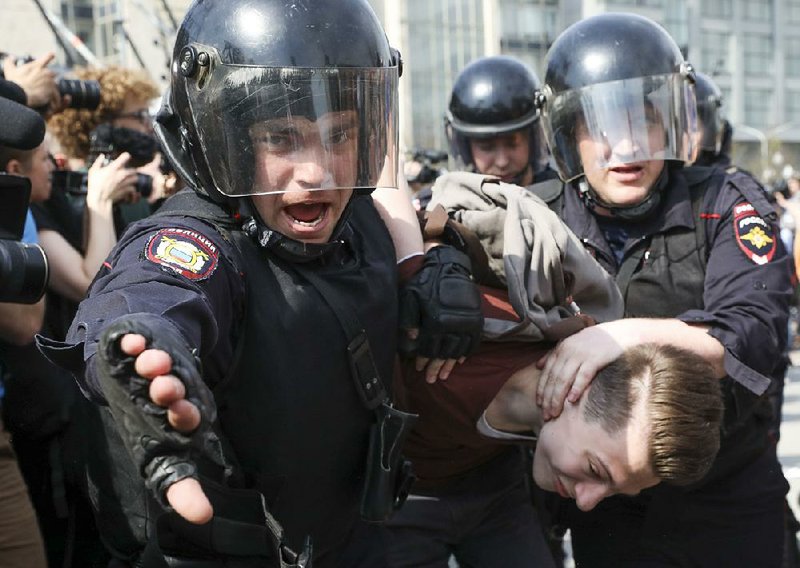MOSCOW -- Thousands of people on Saturday marked President Vladimir Putin's coming fourth inauguration with street protests across Russia against his rule. Police responded by arresting nearly 1,600 of them, according to a monitoring group.
Police dragged the organizer, 41-year-old opposition leader Alexei Navalny, out of the Moscow rally by his arms and ankles minutes after he arrived. Protesters packed Pushkin Square in the center of the city nevertheless, and they were met by columns of riot police who charged into the crowd to try to disperse it.
OVD-Info, an organization that monitors political repression, said late Saturday that 1,599 people had been detained at demonstrations in 26 Russian cities. It said 702 were arrested in Moscow alone, and another 232 in St. Petersburg.
"They're even worse than bandits -- the people in power have made this country unfit for living," said Natalia Znaminskaya, 58, editor of a regional journal in the Moscow suburbs. "No one can survive with these salaries, and in this environment."
Navalny's team organized 90 protests across the country, dubbing them "He is not our czar," a reference to Putin, who was first elected president in 2000 and is already Russia's longest-serving leader since Joseph Stalin.
Images from cities as far-flung as Kaliningrad on the Baltic Sea, Nizhny Novgorod on the Volga River, Krasnoyarsk in Siberia and Khabarovsk in the Far East showed hundreds or thousands of protesters. They chanted "Russia without Putin," "Putin is a thief" and "Out with the czar!" In St. Petersburg, hundreds walked down Nevsky Prospekt, the city's central thoroughfare.
In Russia, protests must receive the green light from authorities to go ahead, and Saturday's rallies were no exception. Authorities in many places, including Moscow, denied permits. In the Russian capital, the whine of police sirens and the chanting crowds clashed with a nearby outdoor international music festival organized by the city, where performers sang a cappella to a small audience.
In Washington, State Department spokesman Heather Nauert criticized the actions of the Russian police.
"The United States condemns #Russia's detention of hundreds of peaceful protesters and calls for their immediate release. Leaders who are secure in their own legitimacy don't arrest their peaceful opponents for protesting," she tweeted.
The protests captured the duality of the political mood in Russia ahead of Putin's inauguration Monday to a fourth term. Saturday's rallies were smaller than the ones that preceded Putin's previous inauguration, in 2012, when some 100,000 turned out in Moscow alone in a wave of winter and spring protests. But the protests also showed the determination of Navalny's sizable number of core supporters, many of them young, who are still willing to risk detention and police violence to make their voices heard.
"We don't have the hope that we'll make Russia wonderful and prosperous overnight," Leonid Volkov, Navalny's chief of staff, said on the Navalny team's live YouTube broadcast encouraging people to join the protests. "The sum of our efforts must match the efforts of those evil people, and then, gradually, we will be able to bend the situation in our direction."
"I'm not too sure what the protesters want, but, economically, we're fine," said a 37-year-old business analyst who would only give her first name, Olga, who happened upon the Moscow rally on her regular weekend walk. "Since Crimea reunited with Russia, and we were hit with sanctions, we've proven that we're able to stand on our own two feet."
Navalny was to be charged with disobeying police, an offense that carries a sentence of up to 15 days, news reports said, though when he would face a judge was not immediately clear. Navalny has served several multi-week stretches in jail on similar charges. He was barred from running for president against Putin earlier this year and has no clear avenue for gaining elected office.
Still, despite having no access through state TV, he has built a following by producing viral videos spotlighting corruption among Russia's ruling elite and describes street protests as the only way to put pressure on the Kremlin. He has built up a network of offices across the country and has staged several nationwide protests over the past year.
His arrest is the latest act of government repression of dissent -- that, along with perceived corruption and a stagnant and sanctions-hit economy, is helping to fuel the protests. Thousands protested in Moscow Monday against the government's effort to block access to the Telegram messaging app.
Fatigue with Putin is another factor motivating the opposition. His new presidential term will keep him in office until 2024, and Moscow is rife with speculation that the 65-year-old Putin will seek to remain in power for as long as he lives.
Information for this article was contributed by Amie Ferris-Rotman and Anton Troianovski of The Washington Post; and by Jim Heintz of The Associated Press.
A Section on 05/06/2018

